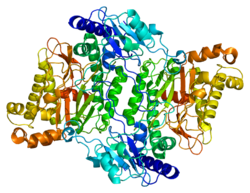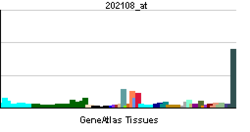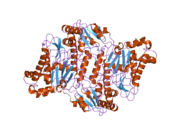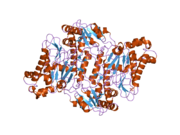- PEPD
-
This article is about human gene. For the pain disorder, see Paroxysmal extreme pain disorder.
Peptidase D 
PDB rendering based on 2iw2.Available structures PDB 2IW2, 2OKN Identifiers Symbols PEPD; MGC10905; PROLIDASE External IDs OMIM: 613230 MGI: 97542 HomoloGene: 239 GeneCards: PEPD Gene EC number 3.4.13.9 Gene Ontology Molecular function • aminopeptidase activity
• metallocarboxypeptidase activity
• peptidase activity
• dipeptidase activity
• manganese ion binding
• metal ion bindingBiological process • proteolysis
• cellular amino acid metabolic process
• cellular process
• collagen catabolic processSources: Amigo / QuickGO RNA expression pattern 
More reference expression data Orthologs Species Human Mouse Entrez 5184 18624 Ensembl ENSG00000124299 ENSMUSG00000063931 UniProt P12955 Q11136 RefSeq (mRNA) NM_000285.3 NM_008820.2 RefSeq (protein) NP_000276.2 NP_032846.2 Location (UCSC) Chr 19:
33.88 – 34.01 MbChr 7:
35.7 – 35.83 MbPubMed search [1] [2] Xaa-Pro dipeptidase, also known as prolidase, is an enzyme that in humans is encoded by the PEPD gene.[1][2][3]
Xaa-Pro dipeptidase is a cytosolic dipeptidase that hydrolyzes dipeptides with proline or hydroxyproline at the carboxy terminus (but not Pro-Pro). It is important in collagen metabolism because of the high levels of aminoacids.[3]
References
- ^ Endo F, Tanoue A, Nakai H, Hata A, Indo Y, Titani K, Matsuda I (Apr 1989). "Primary structure and gene localization of human prolidase". J Biol Chem 264 (8): 4476–81. PMID 2925654.
- ^ Tanoue A, Endo F, Matsuda I (Aug 1990). "Structural organization of the gene for human prolidase (peptidase D) and demonstration of a partial gene deletion in a patient with prolidase deficiency". J Biol Chem 265 (19): 11306–11. PMID 1972707.
- ^ a b "Entrez Gene: PEPD peptidase D". http://www.ncbi.nlm.nih.gov/sites/entrez?Db=gene&Cmd=ShowDetailView&TermToSearch=5184.
Further reading
- Tanoue A, Endo F, Kitano A, Matsuda I (1990). "A single nucleotide change in the prolidase gene in fibroblasts from two patients with polypeptide positive prolidase deficiency. Expression of the mutant enzyme in NIH 3T3 cells". J. Clin. Invest. 86 (1): 351–5. doi:10.1172/JCI114708. PMC 296729. PMID 2365824. http://www.pubmedcentral.nih.gov/articlerender.fcgi?tool=pmcentrez&artid=296729.
- Boright AP, Scriver CR, Lancaster GA, Choy F (1989). "Prolidase deficiency: biochemical classification of alleles". Am. J. Hum. Genet. 44 (5): 731–40. PMC 1715628. PMID 2705457. http://www.pubmedcentral.nih.gov/articlerender.fcgi?tool=pmcentrez&artid=1715628.
- Friedrich U, Brunner H, Smeets D, et al. (1987). "Three-point linkage analysis employing C3 and 19cen markers assigns the myotonic dystrophy gene to 19q". Hum. Genet. 75 (3): 291–3. doi:10.1007/BF00281077. PMID 2881880.
- Maruyama K, Sugano S (1994). "Oligo-capping: a simple method to replace the cap structure of eukaryotic mRNAs with oligoribonucleotides". Gene 138 (1–2): 171–4. doi:10.1016/0378-1119(94)90802-8. PMID 8125298.
- Ledoux P, Scriver C, Hechtman P (1994). "Four novel PEPD alleles causing prolidase deficiency". Am. J. Hum. Genet. 54 (6): 1014–21. PMC 1918181. PMID 8198124. http://www.pubmedcentral.nih.gov/articlerender.fcgi?tool=pmcentrez&artid=1918181.
- Ledoux P, Scriver CR, Hechtman P (1996). "Expression and molecular analysis of mutations in prolidase deficiency". Am. J. Hum. Genet. 59 (5): 1035–9. PMC 1914827. PMID 8900231. http://www.pubmedcentral.nih.gov/articlerender.fcgi?tool=pmcentrez&artid=1914827.
- Pałka JA (1997). "The role of prolidase as an enzyme participating in the metabolism of collagen". Rocz. Akad. Med. Bialymst. 41 (2): 149–60. PMID 9020526.
- Palka JA, Phang JM (1997). "Prolidase activity in fibroblasts is regulated by interaction of extracellular matrix with cell surface integrin receptors". J. Cell. Biochem. 67 (2): 166–75. doi:10.1002/(SICI)1097-4644(19971101)67:2<166::AID-JCB2>3.0.CO;2-V. PMID 9328822.
- Suzuki Y, Yoshitomo-Nakagawa K, Maruyama K, et al. (1997). "Construction and characterization of a full length-enriched and a 5'-end-enriched cDNA library". Gene 200 (1–2): 149–56. doi:10.1016/S0378-1119(97)00411-3. PMID 9373149.
- Muszyńska A, Pałka J, Gorodkiewicz E (2000). "The mechanism of daunorubicin-induced inhibition of prolidase activity in human skin fibroblasts and its implication to impaired collagen biosynthesis". Exp. Toxicol. Pathol. 52 (2): 149–55. PMID 10965990.
- Surazyński A, Pałka J (2002). "FAK-independent regulation of prolidase activity and collagen biosynthesis in MCF-7 cells". Folia Histochem. Cytobiol. 39 Suppl 2: 212–3. PMID 11820613.
- Harris RA, Yang A, Stein RC, et al. (2002). "Cluster analysis of an extensive human breast cancer cell line protein expression map database". Proteomics 2 (2): 212–23. doi:10.1002/1615-9861(200202)2:2<212::AID-PROT212>3.0.CO;2-H. PMID 11840567.
- Forlino A, Lupi A, Vaghi P, et al. (2002). "Mutation analysis of five new patients affected by prolidase deficiency: the lack of enzyme activity causes necrosis-like cell death in cultured fibroblasts". Hum. Genet. 111 (4–5): 314–22. doi:10.1007/s00439-002-0792-5. PMID 12384772.
- Strausberg RL, Feingold EA, Grouse LH, et al. (2003). "Generation and initial analysis of more than 15,000 full-length human and mouse cDNA sequences". Proc. Natl. Acad. Sci. U.S.A. 99 (26): 16899–903. doi:10.1073/pnas.242603899. PMC 139241. PMID 12477932. http://www.pubmedcentral.nih.gov/articlerender.fcgi?tool=pmcentrez&artid=139241.
- Ota T, Suzuki Y, Nishikawa T, et al. (2004). "Complete sequencing and characterization of 21,243 full-length human cDNAs". Nat. Genet. 36 (1): 40–5. doi:10.1038/ng1285. PMID 14702039.
- Beausoleil SA, Jedrychowski M, Schwartz D, et al. (2004). "Large-scale characterization of HeLa cell nuclear phosphoproteins". Proc. Natl. Acad. Sci. U.S.A. 101 (33): 12130–5. doi:10.1073/pnas.0404720101. PMC 514446. PMID 15302935. http://www.pubmedcentral.nih.gov/articlerender.fcgi?tool=pmcentrez&artid=514446.
- Lupi A, De Riso A, Torre SD, et al. (2004). "Characterization of a new PEPD allele causing prolidase deficiency in two unrelated patients: natural-occurrent mutations as a tool to investigate structure-function relationship". J. Hum. Genet. 49 (9): 500–6. doi:10.1007/s10038-004-0180-1. PMID 15309682.
- Gerhard DS, Wagner L, Feingold EA, et al. (2004). "The status, quality, and expansion of the NIH full-length cDNA project: the Mammalian Gene Collection (MGC)". Genome Res. 14 (10B): 2121–7. doi:10.1101/gr.2596504. PMC 528928. PMID 15489334. http://www.pubmedcentral.nih.gov/articlerender.fcgi?tool=pmcentrez&artid=528928.
PDB gallery Categories:- Human proteins
- Chromosome 19 gene stubs
Wikimedia Foundation. 2010.


